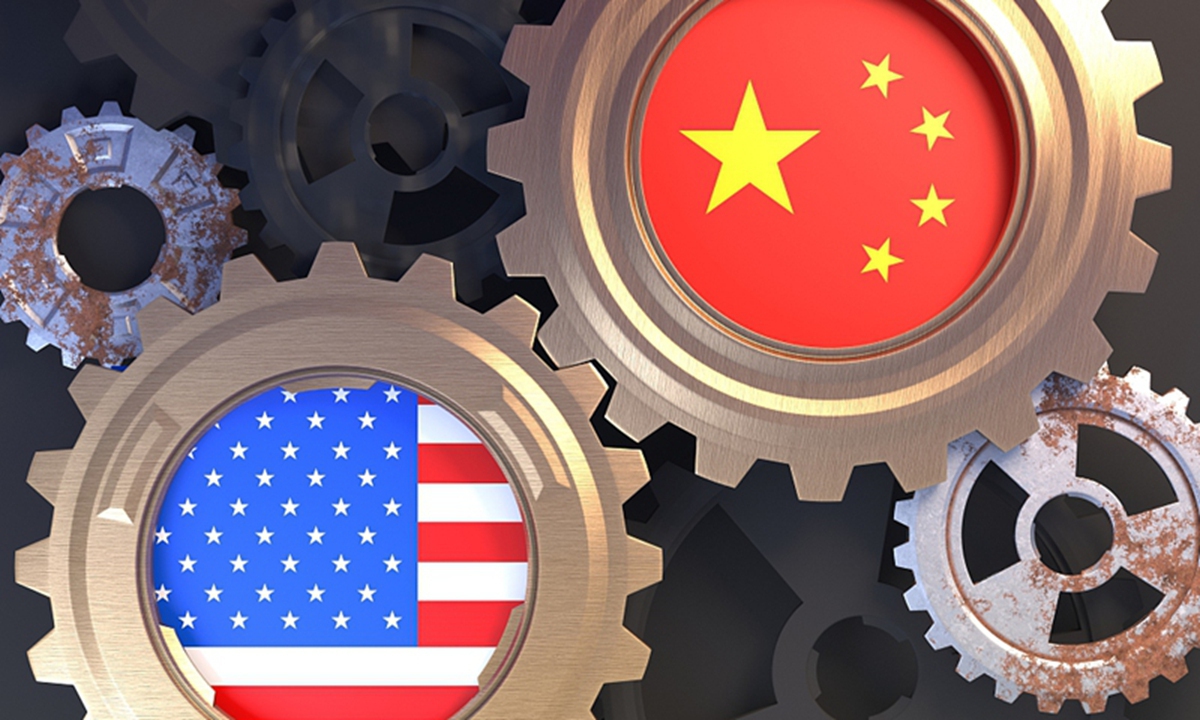
File photo: China US
With the escalating US containment targeting China, the "decoupling" trend in trade between the two countries may be inevitable, but it is still upsetting to really see a substantial decline in bilateral trade, exacerbating negative sentiment over bilateral relations and the world economic recovery.China's trade with the US plunged 17.4 percent year-on-year in US dollar terms in the first two months of this year to $101.85 billion, according to Chinese customs data released on Tuesday. Specifically, Chinese exports to the US decreased 21.8 percent year-on-year during the January-February period, while imports shrank 5 percent. China's trade with the US declined 10.6 percent year-on-year in yuan terms during the same period to 702.98 billion yuan ($101.27 billion).
Quite a number of reasons could explain the drop in China-US trade, such as US tariffs on Chinese goods, US bans restricting high-tech exports to China, weakening US consumer demand following rising prices from the second half of last year, logistics disruption due to the pandemic, and US' nearshore-sourcing and "friend-sourcing" push aimed at replacing Chinese supply chains.
Most importantly, however, the unfavorable start to China-US trade this year indicated that there is still no sign of stopping the "decoupling" trend within bilateral trade, which has been confirmed by a growing number of figures.
For instance, while US-China trade in goods hit a new record at $690.6 billion in 2022, according to data published by the US Bureau of Economic Analysis, the importance of bilateral trade to the two countries' respective foreign trade has declined to varying degrees. The proportion of bilateral trade to China's foreign trade fell to 12.04 percent in 2022, from 14.21 percent in 2017, while the proportion of bilateral trade to the US' total trade declined to 13.08 percent in 2022, from 16.34 percent in 2017, according to statistics.
There is no denying that China-US trade is now facing some difficulties, of which a large part surrounds geopolitical challenges. And as long as US policies aimed at containing China's development remain in place, it will be increasingly hard for bilateral trade to play the role as the "ballast stone" in China-US relations. Washington has made no secret of the strategic purpose of maintaining its own technological advantages by constantly stepping up sanctions against China in the economic and trade field and implementing a "decoupling" policy across high-tech industrial chains.
The US sanctions and bills targeting China as well as the proposals that are in the works showed that the US' so-called competition with China is in fact an all-round suppression and containment, a zero-sum game that has completely sabotaged a peaceful competition environment and endangered the world's economic stability.
Indeed, the development has already aroused concerns in the business world. For example, Jamie Dimon, JPMorgan Chase & Co's chief executive officer, said on Monday that the relationships between China and the US is among his top concerns when it comes to the economy.
Such fears are not alarmist, since US attempt to "decouple" from China has not just hurt US businesses and consumers by adding inflationary pressure and reducing the market share of American tech companies in China, but also destabilized global industrial chains and supply chains, putting everything under great uncertainty.
It needs to be pointed out that despite US crackdown on China, other countries have been strengthening their economic and trade ties with China, as reflected by the trade between China and ASEAN, which increased 9.6 percent year-on-year in the first two months of this year.
Of course, that doesn't mean we can just let China-US trade slide. While there may be difficult and sensitive issues between China and the US, the economic and trade cooperation should not be among them, which represents areas both sides can exchange economic interests and achieve win-win results. Moreover, even though economic relations cannot substantially improve bilateral relationship, they can help alleviate the pressure from confrontations and conflicts in other areas to a certain extent. This is also why China still needs to explore the most suitable way for both sides to get along with each other, especially in the economic field. The world economic recovery also needs a stable China-US trade relationship.



